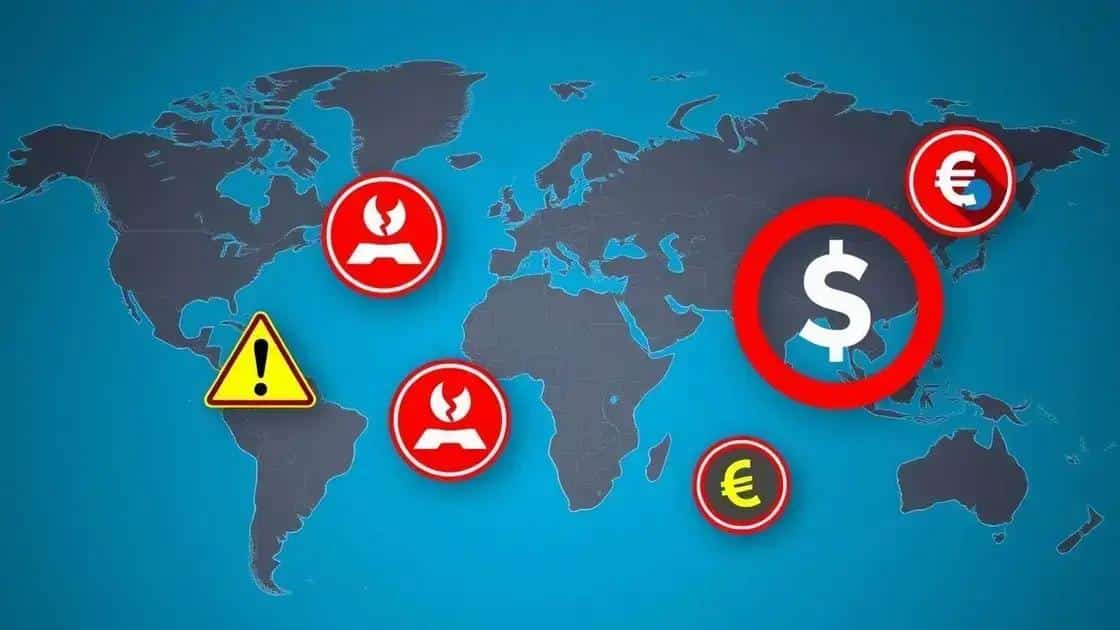Economic sanctions and global trade impact: what you need to know

Economic sanctions significantly impact global trade by restricting trade relations, causing economic strain, and influencing political dynamics, while the future may see more targeted sanctions and the emergence of new alliances.
Economic sanctions can dramatically affect global trade, often reshaping economic alliances and market strategies. Have you ever wondered how these policies influence the cost of goods or the flow of resources? In this article, we’ll navigate through the intricate web of sanctions and their effects on trade.
Understanding economic sanctions and their purpose
Understanding economic sanctions is crucial to grasping their profound impact on global trade. These measures are often imposed by countries or international organizations to influence political behavior. Sanctions can restrict financial transactions, trade in specific goods, or limit access to resources.
Types of Economic Sanctions
There are several types of economic sanctions, each serving different purposes:
- Trade sanctions: Limit or prohibit trade with specific nations.
- Financial sanctions: Block access to financial systems or prohibit transactions.
- Investment sanctions: Prohibit investments in particular sectors or countries.
- Travel bans: Restrict travel for specific individuals.
These sanctions aim to alter a nation’s policies or actions without resorting to military intervention. By disrupting trade relationships, they can compel governments to reconsider their decisions. The consequences, however, can extend beyond the targeted regime, impacting ordinary citizens and global markets.
Purpose of Economic Sanctions
The primary purpose of economic sanctions is to send a message. They are proffered as a non-violent response to actions that violate international norms. For instance, sanctions can be a response to human rights violations, nuclear proliferation, or acts of aggression.
Implementing sanctions often aligns with diplomatic efforts, attempting to isolate a nation both politically and economically. While the intention is to foster change, the effectiveness of sanctions varies. In some cases, they lead to negotiations, while in others, they might entrench the targeted regime.
Understanding how economic sanctions influence countries and their citizens can illuminate their complex role in international relations. They not only affect the governments but can also reshape trade practices, leading to shifts in global market dynamics.
Historical examples of sanctions and their effects
Throughout history, economic sanctions have been utilized as tools to exert pressure on governments and influence global trade. These measures often aim to restrict a nation’s trade and financial activities to enforce compliance with international laws or norms. Examining historical examples can reveal how sanctions impact nations and their economies.
Case Study: The Sanctions on South Africa
One notable example is the sanctions imposed on South Africa during the apartheid era. These restrictions, which included trade and investment bans, aimed to pressure the government into dismantling its racially discriminatory policies. As international awareness grew, many countries joined forces to implement these sanctions. The result was significant economic strain, ultimately contributing to the end of apartheid.
Sanctions on Iraq
Another critical case is the economic sanctions placed on Iraq after the Gulf War in the 1990s. The United Nations imposed severe restrictions on trade, focusing particularly on oil, which was essential to Iraq’s economy. While aimed at limiting the regime’s capabilities, these sanctions also adversely impacted the civilian population, leading to widespread humanitarian crises.
In both examples, economic sanctions served as a means to challenge objectionable policies. However, they also highlighted the critical balance between promoting political change and ensuring the well-being of ordinary citizens. Such measures can lead to unintended consequences, often hurting those they intend to protect while failing to achieve their broader goals.
The Case of Iran
Sanctions against Iran, particularly concerning its nuclear program, illustrate the complexity of using economic pressure. Various nations implemented sanctions targeting key sectors like oil and finance. While the intent was to persuade Iran to alter its nuclear ambitions, these measures also affected global oil prices and led to significant economic challenges within Iran.
These historical examples emphasize the intricate relationship between economic sanctions and global trade. They showcase how sanctions can shape international relations, create economic consequences, and affect broader geopolitical landscapes.
The role of sanctions in global trade dynamics

The role of sanctions in global trade dynamics is significant and complex. Multiple countries impose these measures to influence behaviors or policies of other nations. This interaction affects not just the targeted country but also global economic relationships.
Impact on Trade Relationships
When sanctions are imposed, trade relationships can shift dramatically. Countries that support the sanctions may reduce or cut off trade with the targeted nation. This shift affects the availability of goods and can lead to increased prices.
- Trade alternatives: Nations often seek new partners to replace lost trade. For instance, if one country imposes sanctions, the affected nation may look to others for necessary imports.
- Market shifts: Sanctions can lead to changes in supply and demand. As options decrease for goods, prices may rise, affecting consumers and businesses.
- Economic isolation: Long-term sanctions can result in a country becoming economically isolated. This isolation can stifle innovation and growth.
Countries often weigh the benefits of sanctions against the potential fallout on global supply chains. This dynamic can lead to unexpected alliances and trade patterns. For instance, countries may strengthen ties with other nations that oppose the sanctions.
Effects on Global Markets
The ripple effects of economic sanctions impact global markets in various ways. Industries that rely heavily on exports may suffer due to reduced access to foreign markets. Additionally, sanctions can create volatility in commodity prices.
During sanctions, the targeted country may experience reduced foreign investments, causing economic slowdown. This slowdown can affect global supply chains and production rates across different sectors.
As these dynamics evolve, the long-term implications of sanctions on global trade will become increasingly significant. Understanding the comprehensive role of sanctions helps clarify their impact on international trade policies and practices.
Challenges faced by countries under sanctions
Countries under sanctions face numerous challenges that affect their economies and citizens. These measures are designed to pressure governments but often result in significant hardships for ordinary people. Understanding these challenges is crucial for analyzing the broader impact of sanctions on global politics.
Economic Strain
One of the most immediate challenges for countries under sanctions is economic strain. Restrictions can limit access to essential goods and services. This often leads to:
- Inflation: Prices for basic necessities can soar as supply dwindles, making it difficult for families to afford food and medicine.
- Unemployment: Industries may struggle to operate or produce goods, resulting in job losses for many workers.
- Reduced investment: Foreign investors often withdraw, seeking safer environments, which stifles economic growth.
As these economic pressures mount, nations may find it challenging to maintain stability. The diversion of funds to address urgent needs can hinder investment in infrastructure, education, and healthcare.
Social Consequences
In addition to economic strain, there are serious social consequences. As living conditions deteriorate, citizens often bear the brunt of sanctions. Access to vital services like healthcare becomes limited, and education systems may suffer.
People’s trust in their government may erode as they witness the impact of sanctions on their daily lives. This discontent can lead to protests and civil unrest. Communities often struggle to maintain social cohesion in the face of adversity.
Moreover, humanitarian issues arise as international aid organizations may face restrictions that limit their ability to help those in need. This can create a cycle of suffering where the need for assistance grows while the means to provide it dwindle.
Political Implications
Additionally, sanctions can lead to a rise in nationalism. Governments may use sanctions as a rallying point to unite citizens against foreign threats. This can result in the government consolidating power, further diminishing political freedoms.
In some cases, countries may also seek alliances with other nations subject to similar sanctions. These new alliances can change global power dynamics, as countries work together to resist external pressures.
Recognizing the multifaceted challenges faced by nations under sanctions is vital for understanding their resilience and strategies for coping with economic and social pressures.
Future trends: sanctions and global trade relations
The future of sanctions and global trade relations is likely to evolve significantly as international dynamics shift. With increasing globalization, countries are exploring new strategies to apply economic pressure while minimizing collateral damage. Understanding potential trends helps in anticipating how nations will navigate these complex issues.
Shifts in Global Alliances
As geopolitical tensions rise, nations may seek to form new alliances. These partnerships can change how sanctions are implemented and enforced. Countries may band together to either resist sanctions or to enhance their effectiveness. This creates a more intricate web of international relations, affecting trade routes and agreements.
- Emerging markets: Developing nations may also gain more influence as they become alternatives for trade and investment.
- Regional cooperation: Countries within a region may collaborate to counteract the effects of sanctions imposed by external powers.
- New trading blocs: The rise of trading coalitions can shift trade dynamics, allowing sanctioned countries to find new markets.
Global trade relations will increasingly reflect these shifting alliances, impacting supply chains and economic interactions.
Increased Use of Targeted Sanctions
Another trend is the movement toward more targeted sanctions rather than blanket measures. These selective approaches aim to minimize the impact on the general population. Instead of affecting entire economies, sanctions may focus on specific individuals, companies, or sectors. This strategy seeks to maintain pressure without causing widespread suffering.
The effectiveness of targeted sanctions relies on precise intelligence and international cooperation. Countries and organizations must coordinate actions to ensure that these sanctions have the intended effect.
Impact of Technology on Sanctions
Technology will also play a crucial role in shaping future sanctions. Advances in data analytics and tracking can enhance compliance efforts. Governments can use technology to monitor transactions and enforce sanctions more effectively. This increased capability allows for rapid responses to violations, making sanctions more agile and responsive.
The rise of cryptocurrencies presents both challenges and opportunities. While these digital currencies can offer economic alternatives to sanctioned nations, they also create new avenues for evading sanctions.
As economic sanctions and global trade relations continue to develop, countries will need to adapt to a rapidly changing environment. Understanding these trends can provide insight into how nations will engage on the global stage.
FAQ – Frequently Asked Questions about Economic Sanctions and Global Trade
What are economic sanctions?
Economic sanctions are measures imposed by countries to influence the behavior or policies of other nations, often involving trade restrictions.
How do sanctions affect global trade?
Sanctions can disrupt trade relationships, leading to shifts in supply and demand, increased prices, and changes in market dynamics.
What challenges do countries face under sanctions?
Countries under sanctions often experience economic strain, social consequences, and reduced access to essential services like healthcare.
What future trends might we see in sanctions and trade relations?
Future trends may include more targeted sanctions, new alliances forming, and an increased role of technology in monitoring and enforcement.





